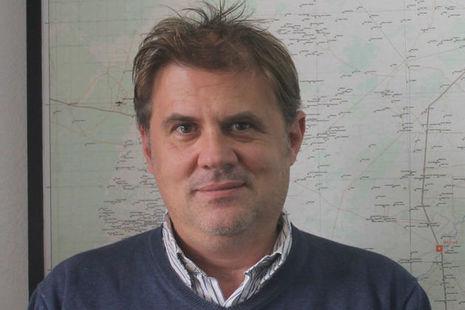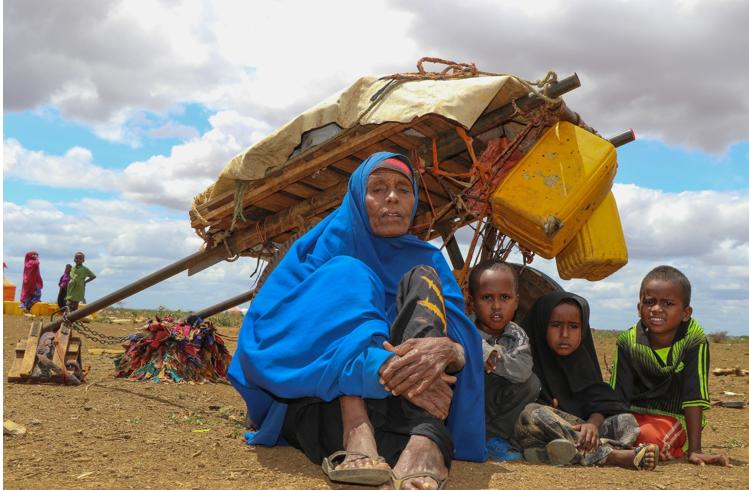OP-ED: Act now, Act together, Act quickly

By Damon Bristow
This year’s World Humanitarian Day comes at a trying time with Somalis a facing one of the worst humanitarian crises ever experienced.
Take the example of 58-year-old Sangab Hassan and her three grandchildren were displaced from a village in Bakool, 150 kilometres from Baidoa. The donkey was too weak to carry both the children and their mother, so Sangab had to leave her daughter who was too sick to take on the treacherous journey to Baidoa.
Sadly, this is a reality for millions of Somalis.
The statistics are sobering. 7.7 million Somalis require emergency aid right now – almost half the population. One million have been displaced this year because of drought and conflict. And over 1 in 10 Somalis are now on the brink of famine, with 213,000 people already in famine-like conditions. Malnutrition rates amongst children are skyrocketing. Over 386,000 are severely malnourished and at least 500 have died.
Food and water have become scarce, with prices of commodities more than doubling, placing basic needs out of the reach of families across the country. Russia’s illegal invasion of Ukraine has worsened the humanitarian suffering by driving up the global cost of food and fuel event further.
My Somali colleagues tell me that this is a situation not seen in more than 40 years – the numbers we are seeing and stories we are hearing now, look and sound a lot like the stories of 2011 when 250,000 Somalis, mostly children, lost their lives due to famine.
With four failed rainy seasons already and a fifth expected, it is essential we learn the lessons of the past and mobilise support now to stop drought tipping over into widespread famine.
As one of the leading humanitarian donors to Somalia, we recognise that we need to act quickly. This year the UK has so far spent over £76 million on humanitarian efforts in the East Africa region, with recent allocations prioritising protection against immediate threats to life. In Somalia we have added another £5 million to our response.
This is going towards providing lifesaving cash assistance to over 310,000 people – enabling households to buy food and other essential items – helping half a million people displaced by drought get access to emergency health and sanitation, and delivering services in 128 health and nutrition facilities across the country.
To get the job done we are working with likeminded donors such as the USAID, Qatar and the Office of the President’s Special Envoy on Drought in raising awareness and support for the crisis in Somalia.

Sangab is one of tens of thousands who have benefited from UK support. With the cash assistance, she has been able to buy food and water to feed her three grandchildren. Like thousands others, she continues to receive health care and other supplies at one of the IDP camps in Baidoa.
In the near future she will need to make a difficult call on whether to stay in Baidoa or return home to rebuild her life. We know that most IDPs displaced by climatic factors don’t return home, but are part of Somalia’s rapid urbanisation story. This is where development and durable solutions support should kick in, in a way that ensures resilience to future climate shocks.
The impact of climate change to this crisis cannot be underestimated. Severe droughts and other climate extremes are becoming more intense and more frequent in Somalia due to the impacts of climate change and the severe environmental degradation Somalia has experienced. Projections are for this to worsen in future and Somalia is one of the most vulnerable countries in the world to the impacts.
The creation of a new Ministry of Environment and Climate Change in the Federal Government will bring a much needed focus on these issues within Government. It is critical that the most vulnerable countries like Somalia are able to access more climate finance and the UK as COP president has championed the importance of adaptation and support to the most vulnerable countries and communities. We stand ready to work with the new Ministry to tackle these issues the underlying drivers of climate vulnerability
Finally, on this World Humanitarian Day, I would like to pay tribute to all aid workers in Somalia, national and international, who are helping provide life-saving support to people like Sangab and her family. Despite all of the progress made in recent years, Somalia remains one of the most challenging environments to deliver aid with frontline humanitarian workers delivering heroic efforts and great personal risk – your commitment and service are an inspiration to us all.
The author is the UK Development Director